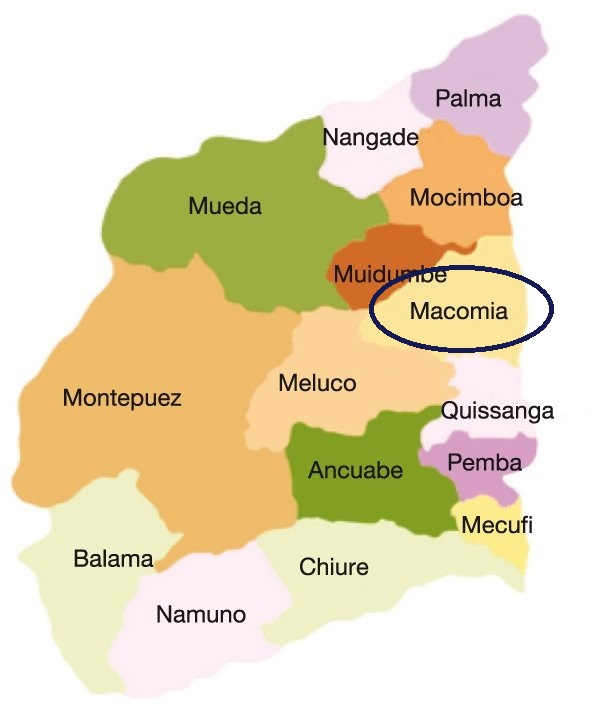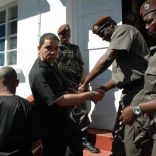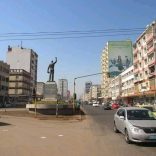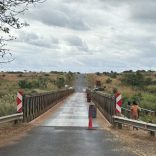Mozambique: Police station destroyed after operation against theft of fuel
Mozambique: Population complain of police inaction against attackers in Cabo Delgado – report

Macomia, 11 Juin 2018. File photo: AFP
Dozens of people attacked a police station in northern Mozambique on Thursday, September 27, 2018, demanding that the police hand over a man suspected of being one of the jihadists who are spreading terror in the region.
The crowd accused the authorities of failing to ensure their protection against the attacks by the group, also known as ‘al shabab’, which have killed more than fifty civilians since they started a year ago.
“Around 10:00 a.m. this morning, a group of young people marched (…) on the police station (in Macomia) to demand that they be given a man suspected of killing and beheading a villager,” an unnamed witness told AFP.
More than 50 civilians killed in a year
The police had to fire warning shots into the air to disperse the mob, the same source added.
For several months, villages in Cabo Delgado province have been the target of deadly attacks by a group of radical Muslim youth, hostile to the government, which has already killed more than 50 civilians.
Born about four years ago in the northern province, which borders Tanzania, the movement nicknamed the ‘shebabs’ (young people in Arabic), consists of young people radicalised by contact with a foreign imam who has settled in the region, according to an RFI report.
Estimated at between 100 and 500 Mozambican, Tanzanians and Somali youths, the group espouses a strict interpretation of the Koran and militarised gradually to launch his first attack on October 5, 2017 against a police station and an army barracks in the city of Mocimboa da Praia.
According to the Mozambican police, its fighters were trained in Tanzania as well as in the Democratic Republic of Congo.
People no longer trust police and army
The think tank International Crisis Group admits that there could be links between this group and its namesake in Somalia, seeking to expand its network in southern Tanzania and northern Mozambique, the only predominantly Muslim region of the country.
Since then, it has launched twenty or so increasingly violent attacks, the latest of which came on September 20, 2018.

The army and police have made numerous arrests and deployed large numbers of reinforcements in the area close to the Tanzanian border, but have failed to stop the raids.
“The people no longer trust the police. The police and the army are failing to protect them, so people want to take justice into their own hands,” another resident said on the phone.
“The police and the army are there but the attackers continue to invade our villages and commit atrocities, and no-one is arrested,” he complained.
“We are determined to neutralise any groups trying to disrupt the order and tranquillity in Cabo Delgado province,” President Nyusi of Mozambique told the United Nations General Assembly in New York on 26 September.
“We are counting on the cooperation of all,” he continued, warning against the risks of attacks “spreading to neighbouring countries”.
The rebellion worries the authorities in Maputo as well as major oil companies such as Exxon, Anadarko and ENI, who have begun installing infrastructure to exploit promising offshore gas deposits in the region.
Mozambique: les attaques des shebabs suscitent la colère contre les autorités
Des dizaines de personnes ont attaqué le 27 septembre 2018 un commissariat du nord du Mozambique pour exiger de la police qu’elle leur livre un des djihadistes présumés qui sèment la terreur dans la région. Elles accusent les autorités de ne pas assurer leur protection. Depuis sa première attaque lancée il y a un an, ce groupe, surnommé aussi shebab, a tué plus d’une cinquantaine de civils.
«Vers 10h ce matin, un groupe de jeunes a marché (…) sur le poste de police (à Macomia) pour exiger qu’on leur remette un homme soupçonné d’avoir tué et décapité un villageois», a raconté sous couvert d’anonymat à l’AFP un témoin.
Plus de 50 civils tués depuis un an
Les forces de l’ordre ont dû tirer en l’air pour disperser la population en colère, a-t-il ajouté.
Depuis plusieurs mois, les villages de la province du Cabo Delgado sont la cible d’attaques meurtrières d’un groupe de jeunes musulmans radicaux hostiles au gouvernement qui a déjà tué plus d’une cinquantaine de civils.
Né il y a environ quatre ans dans cette province du Nord, frontalière de la Tanzanie, ce mouvement surnommé les shebabs (les jeunes en arabe), comme en Somalie, se serait radicalisé au contact d’un imam étranger installé dans la région, selon RFI.
Estimé à plusieurs centaines de sympathisants, entre 500 et 100 jeunes Mozambicains mais aussi Tanzaniens et Somaliens, le groupe revendique une application stricte du Coran.
Il s’est petit à petit militarisé jusqu’à lancer sa première attaque le 5 octobre 2017 contre un commissariat de police et une caserne de l’armée dans la ville de Mocimboa da Praia.
Ses combattants auraient, selon la police mozambicaine, reçu une formation en Tanzanie ainsi qu’en République démocratique du Congo.
La population ne fait plus confiance à la police et à l’armée
Pour le groupe de réflexion International Crisis Group, il pourrait y avoir des liens entre ce groupe et celui homonyme de Somalie qui cherche à étendre son réseau avec le sud de la Tanzanie et le nord du Mozambique, seule région à majorité musulmane de ce pays.
Depuis, il a lancé une vingtaine d’attaques de plus en plus violentes dont la dernière remonte au 20 septembre 2018.
L’armée et la police ont procédé à de nombreuses arrestations et déployé d’importants renforts dans la région, proche de la frontière tanzanienne, sans parvenir toutefois à enrayer ces raids.
«La population n’a plus confiance en la police. La police et l’armée échouent à assurer sa protection, alors les gens veulent rendre la justice eux-mêmes», a expliqué un autre habitant joint au téléphone depuis la capitale, Maputo.
«La police et l’armée sont là mais les assaillants continuent à envahir nos villages et à commettre des atrocités, mais personne n’est arrêté», a-t-il regretté.
Inquiétudes des grands groupes pétroliers
«Nous sommes déterminés à neutraliser les groupes malfaisants qui essaient de troubler l’ordre et la tranquillité de certains districts de la province du Cabo Delgado», a répété le 26 septembre le président mozambicain, Filipe Nyusi, devant l’Assemblée générale des Nations Unies à New York.
«Nous comptons sur la coopération de tous», a-t-il poursuivi en mettant en garde contre les risques de «propagation (de ces attaques) aux pays voisins».
Cette rébellion inquiète les autorités de Maputo et de grands groupes pétroliers tels qu’Exxon, Anadarko et ENI, qui ont commencé à installer leurs infrastructures dans cette région stratégique pour y exploiter des gisements de gaz off-shore très prometteurs.












Leave a Reply
Be the First to Comment!
You must be logged in to post a comment.
You must be logged in to post a comment.